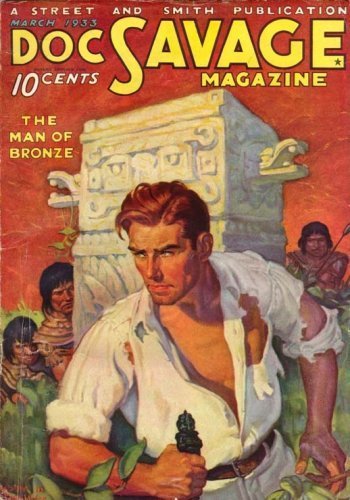Page-Turners and Pulp Fiction in the Digital World

Hard-boiled crime. Bodice-ripping romance. Epic tales of mythological proportions. Futuristic fantasy in a parallel universe. Suave international men of mystery. These are the stuff that put the pulp in pulp fiction. You know what I’m talking about…Conan, The Shadow, Doc Savage, even James Bond —all incarnations of pulp fiction.
Since their heyday in the 20s and 3os, readers have always eaten these books up and eagerly snatched up each new book in the series. Once hooked, readers kept coming back for more. The books were cheap. They were a quick read. And you could easily fit one in your back pocket. The lure of pulp fiction is not lost on readers today. Because of advancements in digital publishing technology, series fiction is making a major comeback.
The tablet may have replaced the pulp but the appetite for series fiction remains. I, for one, couldn’t be happier about it.
Series and Serials – Do You Know What You’re Reading?
I recently attended MystiCon—an annual conference for Science Fiction, Fantasy and Pop Culture—in Roanoke, Virginia. During one of the panels on the craft of writing we got into a side talk (as often happens on panels at SF cons) discussing the difference between series and serials. It quickly became clear that, for some, the lines were blurred.
For me, the distinction is crystal clear. Ian Fleming’s James Bond stories represent perfectly what I believe good series fiction should accomplish. From Live and Let Die to Goldfinger, each book in the series can be read as a self-contained story chronicling the adventures of 007 – British Secret Service Agent, James Bond. Even if you’ve never read any of the other Bond books, you can pick up Dr. No, or perhaps Octopussy, and have a satisfactory reading experience from start-to-finish. However, when read in the context of a series, the stories enhance one another as a whole. For readers who are familiar with the other books in the series, the overarching experience is vastly enriched…They’re left both shaken and stirred.
My paranormal mystery series, the Max Porter Mysteries, function in a similar fashion. You can pick up Southern Belle, the latest book in the series without having read the first, Southern Bound, and still enjoy a complete story. But if you’ve perused the earlier Max Porter tales, you’ve got some a priori knowledge for a richer read. Heck, I’m just happy that you’re reading my books in any order and thanks to those of you who are.
The Cliffhanger Cop-Out
What makes readers keep coming back for more? In serial fiction, the multiple books comprise one full story. In other words, the first book doesn’t really contain a complete book. It’s just Part 1. Lord of the Rings is a prime example. Written as one very long book, the publisher broke it up into three. Some writers rely upon the cliffhanger to ensure that readers are left wanting more and thus, come back for Part 2. Personally, I don’t like to do that to my readers—I think you deserve more than a cheap ploy. From what I can tell, readers really want a series where they can really get to know and grow along with the characters. But, they also want serial fiction in which they are surprised and in which characters change over time.
On a more personal note, if I’m writing a series and nothing’s changing, I get bored as a writer. And, if I’m bored, I’m pretty sure that my readers have lost interest too. In my Post-Apocalyptic Fantasy series, the Malja Chronicles, the protagonist Malja evolves significantly in each book. While at core she is the same character, the Malja you meet in the fourth book, The Way of the Blade, has grown from a girl into a kickass force to be reckoned with.
How do you like your series fiction?
I like to give my readers what they want…and something that they don’t expect with each turn of the page. That way, you get the best of both worlds. How about you? Do you like the cliffhanger? Or, does it make you completely bonkers to have to wait until the next book comes out to resolve a key plot issue? I’d like to know. Who knows? I may even change my mind. For now, I’ll just leave you hanging.
The post Page-Turners and Pulp Fiction in the Digital World appeared first on Stuart Jaffe.



